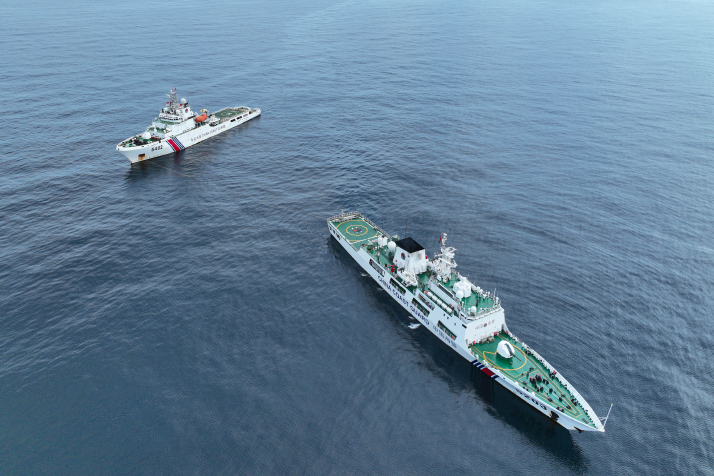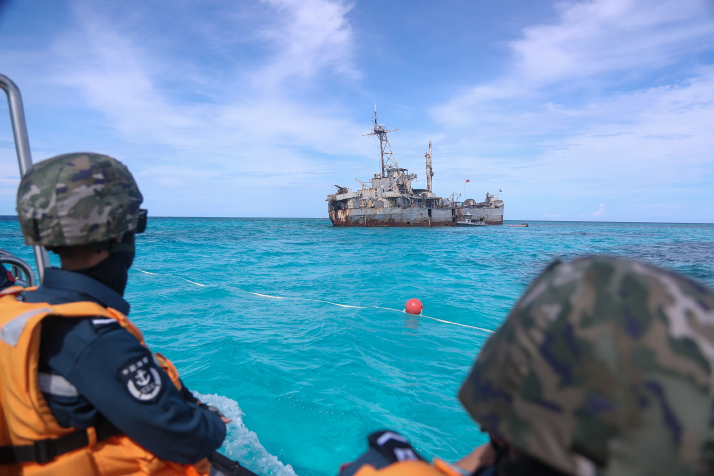| World |
| Supporting China's sovereignty over the South China Sea Islands | |
|
|
 China Coast Guard vessels conduct a drill in the South China Sea on May 21 (XINHUA)
The Philippines on June 17 sent a supply ship and two inflatable boats into the waters near Ren'ai Jiao, or Ren'ai Reef, of China's Nansha Islands, the second attempt following its intrusions in March. The Chinese Coast Guard (CCG) took control measures per the law, including warning, intercepting, boarding, conducting inspections, and forcibly driving them away, CCG spokesperson Gan Yu said later that same day, adding that the Philippines broke its promise by trying to deliver supplies to its illegally grounded warship, the tank landing ship BRP Sierra Madre (LT-57). "We once again sternly warn the Philippine side that all forms of violations and provocations are futile. The CCG will always remain on high alert and stand ready to resolutely safeguard China's territorial sovereignty and maritime rights and interests," Gan said. According to Anthony Carty, professor emeritus at the Beijing Institute of Technology School of Law and visiting researcher at Peking University, the essence of the Nansha Islands dispute has been which country has the closest physical connection to the islands. "It is accepted that Chinese fishermen have regularly used these islands as their home. Fishermen coming from Guangdong and Hainan provinces are there for up to six months a year, using the islands as a base for fishing," he told Beijing Review. "And on that basis, the argument can be made that sovereignty of China follows its citizens." Carty wrote a book titled The History and Sovereignty of the South China Sea, which provides academic proof that China's position on the South China Sea issue is reasonable. Carty mentioned that he spent several decades gathering primary source materials from national archives, specifically from the United Kingdom and France, and a few from the United States. The English edition of the book was released by Beijing-headquartered New Star Press, a publishing house under China International Communications Group, at the 30th Beijing International Book Fair, which unfolded in Beijing from June 19 to 23. The publishing house released the original Chinese edition of the book in March. Into the archives China's Nanhai Zhudao (the South China Sea Islands) consist of Dongsha Qundao (the Dongsha Islands), Xisha Qundao (the Xisha Islands), Zhongsha Qundao (the Zhongsha Islands) and Nansha Qundao (the Nansha Islands). They include, among others, over 250 islands, reefs, shoals and cays of different numbers and sizes, constituting inseparable parts of China's territory. Ren'ai Jiao is situated within the Nansha Islands. The activities of the Chinese people in the South China Sea date back over 2,000 years. Carty spent almost a decade examining national archives from France, the UK and the U.S. stretching back to the late 19th century to clarify the issue of sovereignty over the South China Sea. It's basically a problem arising out of imperial European and American interventions in the region during a time when China was weakened and invaded, he said. He pointed out that China's sovereignty over the South China Sea Islands had never been disputed before the 20th century. But in 1933, France invaded several islands and reefs of the Nansha Islands, creating "the Incident of the Nine Islets." Carty highlighted the discrepancy between the contemporary narrative regarding the Philippines' sovereignty claims in the South China Sea and the historical records from British, French and American archives. These archives reveal an unanimous agreement that the Philippines had no legitimate claim to sovereignty over any islands in the South China Sea. He insisted that the British and French authorities need to acknowledge this contradiction between historical records and contemporary narratives, especially since they claim their own contemporary stance to be neutral on the issue. Going on record In the 1970s, the French compiled an entire dossier refuting the Philippines' claims to any part of the Nansha Islands. It was at the same time that the British Foreign Office legal advisers compiled a comprehensive historical record, concluding that the Chinese mainland fishermen's historical ties of with the islands showed how they belonged to China, a fact never denied and frequently claimed by China. Zhou Jian, former Representative of the Ministry of Foreign Affairs for Boundary and Ocean Affairs, said at the book release that Carty's review of the diplomatic archives of France, the UK and the U.S. helps to "clarify the facts and understand the context of territorial disputes over the islands." These countries were all involved in territorial disputes over the South China Sea Islands at different times, and the archives document their internal considerations, related policies and legal positions concerning these historical events, he said. Regarding China's sovereignty over the South China Sea Islands, Chinese scholars have conducted in-depth research. They have demonstrated China's sovereignty from the angles of history, territory and more, he added. The value of this book also lies in the historical materials it discloses, Zhou stressed. The BRP Sierra Madre, built in 1944, was deliberately grounded by the Philippines in May 1999. "Resupply missions" have grown increasingly frequent, raising concerns and tensions in the region since 2023.  China Coast Guard (CCG) law enforcers prepare to take back the fishing nets Philippine sailors illegally obtained from Chinese fishermen near the Philippine vessel in Ren’ai Jiao and surrounding waters on June 10 (XINHUA)
Following the "resupply missions" on March 5 and 23, the June 17 event has further escalated tensions. Global business publication the Financial Times reported that the Philippine military has in recent months been carrying out a secret mission to reinforce the dilapidated military vessel grounded at Ren'ai Jiao to extend its service life. Chinese Foreign Ministry spokesperson Lin Jian stated on June 21 that recent reports have once again disproved the Philippines' claim that it only resupplies the grounded military vessel at Ren'ai Jiao with living supplies. China has repeatedly said the Philippines have been transporting construction materials, and even weapons and ammunition, to the illegally grounded vessel in an attempt to conduct large-scale repairs and reinforcements to achieve permanent occupation of Ren'ai Jiao. Lin emphasized that the military vessel serves as irrefutable evidence of the Philippines' violation of the spirit of the Declaration on the Conduct of Parties in the South China Sea, issued by the governments of ASEAN member states and the Chinese Government in 2002, and its destruction of the ecological environment in the region. In early May, a transcript of the supposed recording of a phone call between the Chinese side and the Philippines' Western Command Commander Vice Admiral Alberto Carlos on January 3 was revealed, indicating Carlos agreed to a "new model" for resupply missions concerning Ren'ai Jiao. Newspaper Global Times later confirmed the document to be real, citing a source "familiar with the affair," on May 8. The "new model" allowed essential daily supplies delivered to the grounded warship in the subsequent resupply mission after notifying the Chinese side in advance. Based on the "new model" arrangement and humanitarian principle, the Chinese side permitted the Philippine resupply operation, the source told Global Times. Lin said China will not accept the Philippines' actions that seriously infringe upon its sovereignty, and will respond per the law and regulations. He urged Manila to cease provocations and return to the correct path of managing differences through dialogue and consultation at an early time. (Print Edition Title: On the Books) Copyedited by Elsbeth van Paridon Comments to liwenhan@cicgamericas.com |
|
||||||||||||||||||||||||||||||
|
